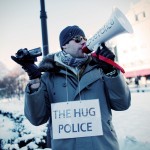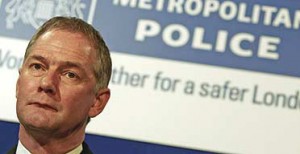Well, yes, for some perhaps, and no doubt for the happy couple.
However, others spent the glorious day in a bare, concrete police cell, pre-emptively arrested for what they might do and untraceable to their loved ones and lawyers. Effectively they were “disappeared”, taken off the streets in case they uttered something that might mar the great day or, heaven forbid, caused some embarrassment.
A few days ago I wrote a piece highlighting my concerns about the threatened security response to possible protesters — drawing comparisons with the mindset, if not the violent tactics, of the thugs in Syria’s security apparatus. But still, in some deep recess of my mind and against all the accumulated evidence from my last 15 years, I found I still had an emotional, residual echo of the notion of British fair play that, really, we don’t do those kinds of things in the UK. Well, then I was a child, and spoke as a child.…
In the run up to the happy nuptials, the Metropolitan Police stated that it had no specific intelligence of any terrorist threat from either dissident Irish republicans, nor from any possible grouping emerging from the Middle East. Despite this, the security forces had launched a massive intelligence-gathering operation to hunt down known “anarchists” who might want to voice their protest against the concept of the monarchy. Activist pages on Facebook were suddenly deleted with no warning, but the company said it was because of registration issues, and not because of the police.
Yes, there may well have been some who wanted to cause violence — after which they could have been arrested legitimately under the terms of the law . However, what the police did in this case was in an altogether different league. Using the methodology if not the brutality of the Syrian mukhabarat, they organised house raids and snatch squads. They banned certain activists from London, and arrested others both in the days before the wedding and on the day itself.
Those caught in the security sweep included a Professor of Anthropology, Chris Knight, and his friends who were planning a bit of mildly amusing street theatre involving a fake guillotine and a Prince Andrew dummy (is that tautologous?).
Others swept up by the security forces included a bunch of environmentalist squatters who were busily tending their market garden, according to rightly concerned MP John McDonnell, and some random “zombies” who wanted to go to an alternative “not the royal wedding” garden party. Hardly the stuff of revolutionary nightmares.
 And then there’s the case of Charlie Veitch, now denounced across the UK media as the known anarchist. Yes, Charlie is anti-royalist and wanted to voice his views, but he runs an internationally-known activist organisation called the Love Police, for chrissakes. The peaceful intentions of the organisation might possibly be given away by the name.…
And then there’s the case of Charlie Veitch, now denounced across the UK media as the known anarchist. Yes, Charlie is anti-royalist and wanted to voice his views, but he runs an internationally-known activist organisation called the Love Police, for chrissakes. The peaceful intentions of the organisation might possibly be given away by the name.…
So what happened? On Thursday evening two police officers, tooled up with proto-Borg tech, muscled their way into the Cambridge home he shares with his girlfriend, Silkie Carlo, declaring that they were there to arrest him and search the place. They had the presence of mind to film the whole process and ask some pertinent questions.
Charlie’s alleged pre-crime? That he had posted a frighteningly prescient video on Youtube saying that he thought he was being spied on, but still critiquing the royal wedding and suggesting that fellow activists get together in Soho Square, London (quite a distance away from the festivities) on the day. OK, so he had a bit of a rant — but that’s what people do on Youtube. Agree with him or strongly disagree, it’s called his freedom of expression — a much-vaunted, traditional British liberty.
But in the eyes of the police, apparently he was “conspiring to cause a possible breach of the peace”, and needed to be locked up. It’s like we’ve time-travelled back to pre-revolutionary 18th century France, where the king could issue a lettre de cachet to send people to the Bastille.
So at the very time that Prince William and his blushing bride were created Duke and Duchess of Cambridge, a British citizen was raided, locked up and hidden away in a police cell in that very city for exercising free speech.
On Thursday night he was hauled off to the Cambridge nick, which then refused to confirm to his understandably upset girlfriend where he was being held, before being transfered to the Met Police on Friday morning and held incommunicado for the rest of the day. Family and lawyers then apparently spent fruitless hours ringing around all the London police stations trying to track him down. So Charlie had effectively been “disappeared”, like a dissident in a totalitarian régime.
So let’s get this straight — we’re talking about the Metropolitan Police spying on known activists (as we all now know they do, after the undercover cop scandal earlier this year) to prevent them from expressing their legitimate political views about the wedding of Kate and Wills. The security forces had already stated that there was no specific terrorist threat, so this was all about preventing an embarrassing incident on the big day. And I’m sorry, but I don’t think that Prevention of Embarrassment is covered by the legal code.
Plus, these arrests were pre-emptive to stop a possible crime which might be committed — and let’s face it, only breach of the peace at that. Not a biggy.
So we are basically looking at the police spying on and then pre-emptively arresting campaigners for being potential dissidents, for ThoughtCrime. How much more Orwellian can it get?
I mentioned the tactics of the Syrian security forces and their brutal crack-down. I’ve also previously written about how the slide towards fascism began in Germany in the 1930s with the brutalisation of internal oppositionists and dissidents .
So let’s really stop and think about this — do we really want to let these early indications slide by, uncontested? After all, we have the Olympics and the Diamond Jubilee next year, and no doubt the same, or extended, powers will come into force. How far will we let it go before we wake up to the threat?
As I’ve written before, with thanks to Pastor Martin Niemoeller:
First they came for the Irish in the 1980s,
But I was not Irish so I did not speak up.
Then they came for the Muslims after 9/11,
But I was not a Muslim, so I did not speak up.
Then they came for the “domestic extremists”,
But I was not an activist, so I did not speak up.
Then they came for me;
and there was nobody left to speak up for me.









